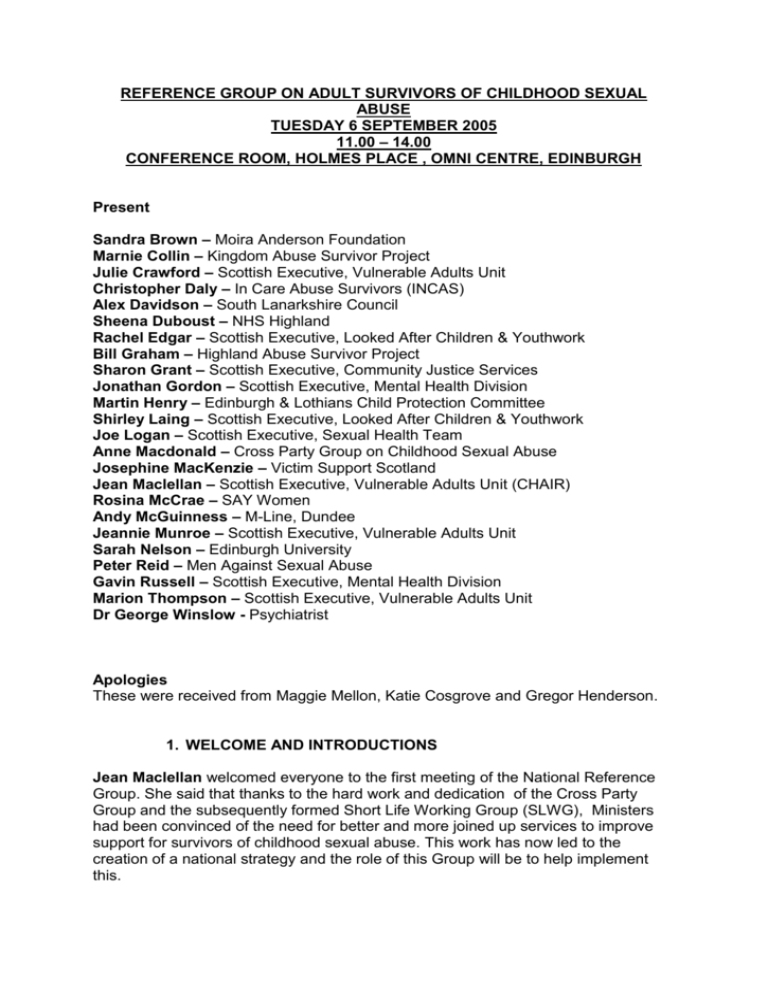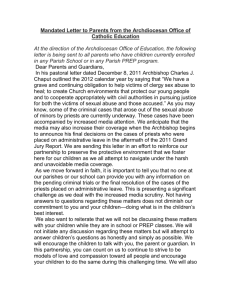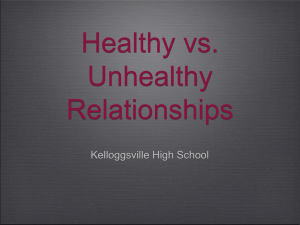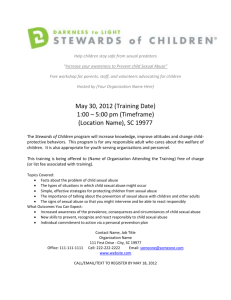
REFERENCE GROUP ON ADULT SURVIVORS OF CHILDHOOD SEXUAL
ABUSE
TUESDAY 6 SEPTEMBER 2005
11.00 – 14.00
CONFERENCE ROOM, HOLMES PLACE , OMNI CENTRE, EDINBURGH
Present
Sandra Brown – Moira Anderson Foundation
Marnie Collin – Kingdom Abuse Survivor Project
Julie Crawford – Scottish Executive, Vulnerable Adults Unit
Christopher Daly – In Care Abuse Survivors (INCAS)
Alex Davidson – South Lanarkshire Council
Sheena Duboust – NHS Highland
Rachel Edgar – Scottish Executive, Looked After Children & Youthwork
Bill Graham – Highland Abuse Survivor Project
Sharon Grant – Scottish Executive, Community Justice Services
Jonathan Gordon – Scottish Executive, Mental Health Division
Martin Henry – Edinburgh & Lothians Child Protection Committee
Shirley Laing – Scottish Executive, Looked After Children & Youthwork
Joe Logan – Scottish Executive, Sexual Health Team
Anne Macdonald – Cross Party Group on Childhood Sexual Abuse
Josephine MacKenzie – Victim Support Scotland
Jean Maclellan – Scottish Executive, Vulnerable Adults Unit (CHAIR)
Rosina McCrae – SAY Women
Andy McGuinness – M-Line, Dundee
Jeannie Munroe – Scottish Executive, Vulnerable Adults Unit
Sarah Nelson – Edinburgh University
Peter Reid – Men Against Sexual Abuse
Gavin Russell – Scottish Executive, Mental Health Division
Marion Thompson – Scottish Executive, Vulnerable Adults Unit
Dr George Winslow - Psychiatrist
Apologies
These were received from Maggie Mellon, Katie Cosgrove and Gregor Henderson.
1. WELCOME AND INTRODUCTIONS
Jean Maclellan welcomed everyone to the first meeting of the National Reference
Group. She said that thanks to the hard work and dedication of the Cross Party
Group and the subsequently formed Short Life Working Group (SLWG), Ministers
had been convinced of the need for better and more joined up services to improve
support for survivors of childhood sexual abuse. This work has now led to the
creation of a national strategy and the role of this Group will be to help implement
this.
Jean asked members to introduce themselves, and to say a bit about their hopes
and fears for the Group . These appear at Annex A.
The membership of the Group was discussed. It was felt generally that while
there was no need to extend membership, the Group should be confident that they
were able to ensure that all issues are covered, and that they should be built into the
programme of work.
Jean confirmed that the group would meet for 18 months to 2 years.
2.
RECOMMENDATIONS
Jean told the group that the recommendations which had come out of the Short life
Working Group (SLWG) had been agreed by Ministers and by the Cross Party Group
thereafter. These would form the basis of the work of the group and the strategy.
3.
ROLE AND REMIT OF REFERENCE GROUP
There was some discussion around the inclusion of non-sexual abuse. Some
members felt that the focus should be on childhood sexual abuse, as it had been a
long and difficult task to get it onto the agenda, but that other forms of abuse should
not be overlooked. Others felt that all forms of abuse should be given equal standing
in the remit, particularly as children had been so long ignored. It was agreed that
there are similarities in services provided for all forms of abuse, abuse manifests
itself in all manner of behaviour and that there should be more focus on the effects
of abuse as a whole and expertise shared from all perspectives.
In summary it was agreed that :
Group to focus on childhood sexual abuse, but all forms of abuse
should be part of the remit.
The effects of abuse and settings where abuse takes place should also
be included.
Outcomes should be applied an application to those who have been
abused in a non-sexual way.
Mapping should be undertaken to ensure best practice but not drawn
out long term.
Identifying specialisms should be included.
Service users’ needs should be included.
Action : It was agreed that Jeannie would prepare a new draft remit based on
discussion and send to the group for comments.This is attached at Annex B.
4.
LAUNCH OF STRATEGY
Anne Macdonald explained that Marilyn Livingstone had put forward a
congratulatory motion about the work on CSA. It was hoped there would be a
debate in Parliament followed by an event thereafter to reflect the cross-cutting
nature of the work and raise to awareness.
Action: Jeannie agreed to chase up dates for debate
5.
CAN OF WORMS
Sarah Nelson told the group about the Can of Worms booklet which she and Sue
Hampson had co-written for Health In Mind and the Executive. She explained that
while there is an urgent need for training and awareness for staff, the emphasis is
not on qualifications, but towards the training on sensitive workers who can display
warmth and empathy towards survivors. The booklet targets people who are
nervous about working with survivors of sexual abuse, and is near to publication.
Action : The Group were asked to give their opinions on the publication by the
end of the week and to send lists of people they think should receive the
booklet to Jeannie. She will then forward information to Mental Health
colleagues who have responsibility for publication.
6.
PRIORITIES FOR WORKPLAN
The Group were asked to discuss what they feel should be the priorities for the
workplan. These are detailed below:
Valuing the talents users /survivors – there should be a Users’ Network.
Identifying gaps in services.
Analysing abuse and the effects caused by it.
Mainstreaming services – let’s see what’s out there and how we can
influence it.
What can we contribute to?
Connecting our issues with other strategies e.g. Childhood/Adolescence
Mental Health Strategy, Choose Life. Care pathways.
Look at range of services available and highlight good practice.
Long term effects of childhood sexual abuse.
Keeping children safe – training, education and awareness.
Demonstration projects
Shared resources – tighten up how we join up services. There should be
consistency with services across Scotland. A follow-on service in Glasgow is
an example of good practice. We need to disseminate what we already have.
Accountability of local authorities for providing services – some local
authorities get away without providing a service.
Survivors should get support regardless of where they are.
Regional resources – This is being covered in the Sexual Health Strategy,
and there has been some mapping of services. Health Boards submitted their
initial plans in March and more detailed plans are due later this month. A
member of the Group could be involved in this, and could have an input into
the recommendations.
Homelessness – the care package for this group of people is flawed and
many go back to mainstream services. There needs to be accountability.
Action: Rosina McCrae agreed to do a presentation on this together with a
relevant SE representative.
8.
Number of survivors going through the courts system and their
treatment – survivors need to hear about victim information and support.
There should be signposting with information being provided and further
services.
Type of service – there should be a network of services people can access,
and this should apply to the courts as well. Often the experience of the
system has the most impact – how they are treated, more than the verdict.
ANY OTHER BUSINESS
Bill Graham told the group about the proposed radio interview with BBC Radio
Scotland. Lewis MacDonald, the Deputy Minister for Health and Community Care
has also been invited to speak.
Bill indicated that it would be an opportunity to highlight the gaps in services in the
Highlands, and the need for a centre for services in the Highlands. It was thought
although things did need to improved, this would also be an ideal opportunity to
highlight the good practice in already in existence and the work done by the Cross
Party and SLWG which had led to the creation of this very positive and welcome
strategy, which in itself aims to raise awareness and develop existing services.
9.
DATE OF THE NEXT MEETING
The date of the next meeting will be Friday 28 October at 11am , running until
around 2pm. This will be in Holmes Place, Edinburgh.
ANNEX A Group Membership
Andy McGuinness, lead counsellor with a male orientated voluntary
organisation said he would like to see more funding go to male support
services, smaller voluntary organisations, and resources used to be used
generally more productively.
Bill Graham who has set up support services in the Highlands told the Group
that there is a lack of services, and clarity of services in the Highlands. There
should be better education and training and early intervention should be
focused on. Survivors should be included in the development of services.
Sandra Brown, founder of the Moira Anderson Foundation and a member of
the Cross Party Group wants to make sure that the Group does not lose sight
of or dilute the recommendations. Prevention is the key for children and the
group needs to focus on this. Training is important and intelligence needs to
be shared.
Sharon Grant is the Co-ordinator of the implementation of the Expert Panel
on Sex Offenders and worked on the Cosgrove Report. Change in behaviour
is important and prevention is better than a cure. Resources to do this may
be a problem.
Rosina McCrae is a member of the Cross Party Group and is a lead member
of SAY Women, a voluntary organisation based in Glasgow which offers a
through care package for survivors. While they work primarily with women,
they do some work with men. Rosina feels that the links between childhood
sexual abuse and homelessness, alcohol, drugs and challenging behaviour
should be better recognised. She is concerned that the Group will be shortlife and therefore issues may end up being forgotten.
Rachel Edgar is head of Looked After Children and Youthwork in SE and is
involved in work around historic abuse in children’s care homes. She hopes
that the Group make sure that survivors of institutional abuse will have access
to services. The focus of the Group should be wider than childhood sexual
abuse, covering all forms of abuse.
Peter Reid works with adult males who have been abused as children. He
would like more focus on prevention, realising the emotional impact of abuse.
Christopher Daly is a petitioner for institutional abuse. He wishes all forms
of abuse to be dealt with including physical and psychological/emotional
abuse. Not all services cover childhood sexual abuse and only tackle certain
issues. His fear was that issues other than sexual abuse would not be
addressed within the Group.
Sarah Nelson has had close links with children who have suffered sexual
abuse, has worked on identifying abuse and has conducted extensive
research in the field generally. She indicated that more that 50% of the client
group is in the mental health system and that prevention is important with
primary intervention in communities.
Alex Davidson, as Head of Adult Services in South Lanarkshire represents
the Association of Directors of Social Work (ADSW). He stressed that the
right issues need to be tackled, and there needs to be more joint working
through community planning. Alex cited the work on The same as you? as
being a good example of this. There needs to be more cross-cutting work
between departments such as Health and Housing, and more resources for
training and understanding the needs of survivors. Police and Social Work
should be included in this.
George Winslow is a retired consultant psychiatrist. He emphasised the
need for joined up services between statutory and non-statutory
organisations. The work of the group raises complex issues and he said we
should strive to accommodate everyone’s expectations.
Anne Macdonald is co chair of the Cross Party Group on Childhood Sexual
Abuse and has worked extensively in the field generally, as well as more
specifically with male and in-care survivors. There needs to be a good
strategy with a care pathway model. It is not about getting new money but
using existing resources.
Martin Henry has tactical responsibility to statutory agencies dealing with
child protection issues, is an advisor to the Catholic Church and has an
interest in institutional abuse. Ethnic minorities, lesbian and gay people,
homelessness need to be discussed. There is a need for joined-up services
and statutory agencies need to take ownership/responsibility for what has
happened to survivors. There is a need to use lessons learned from adult
survivors and pass this on to children.
Josephine MacKenzie has spent 18 years as a practitioner in Victim
Services and was involved in setting up the INCAS group. The scene needs
to be set before people will disclose what has happened to them. The
strategy and services need to be informed by survivors, as well as all
agencies.
Joe Logan is working on the National Sexual Health Strategy, which was
launched in January 2005. The work on this strategy can be linked with the
work of the group, and the issues of the group can be used in the plans of the
Sexual Health Strategy Advisory Group. He hope to serve as a bridge
between the groups. Resources and limited knowledge base could pose
problems.
Sheena Duboust is training as a Psycho-Sexual Therapist. She has helped
set up group in Highland dealing with disclosing abuse This is raising
awareness about the fact that abuse can cause sexual problems for adults.
There is a need to raise awareness on front-line health services, and a
network of people could be developed. Her anxiety is that being such a large
group, decisions may end up not being made.
Gavin Russell and Jonathan Gordon work on the Choose Life, the Suicide
Prevention Strategy and the National Programme for Improving Mental Health
& Well-Being which deals with stigma, discrimination, promoting recovery and
awareness raising. They are presently co--producing the Can of Worms
booklet with Health In Mind and hope to get views on distribution. Their
concern is what happens when the resources are finished.
Marnie Collin works for the Kingdom Abuse Survivor Project. She thinks
there should be security and stability in services and users must be able to
access appropriate services regardless of where they live. Her fear was that
there might be too much for the group to take on, so priorities must be agreed
on.
ANNEX B
Suggested Remit
To provide ongoing advice to Scottish Ministers on implementation of the Adults
Survivors Strategy by:
1. Working in a cross-cutting and holistic way:
which will identify to the widest possible range of services and
interests, any CSA issues which are relevant to their work
to ensure that wherever any other interlinked focus of abuse –physical
and emotional – emerges as very significant, we will seek to ensure
that relevant services take action.
2. Reviewing and identifying the level of current services, in order to support and
sustain existing services and to develop additional ones based on best
practice. Developing performance indicators and outcome measures which
appropriately reflect these.
3. Addressing the need for, and developing, innovative and appropriate
education and training. This would promote preventative approaches,
strategies and service delivery, increased awareness, improved assessment
strategies, early intervention, prevention and inclusion.
4. Ensuring that support and supervision in all relevant disciplines is provided
for those working with adult survivors.
Underpinned by values:
Being inclusive, appreciative, positive and empathetic.








